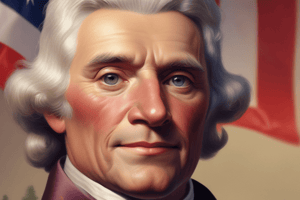Podcast
Questions and Answers
Who was the third President of the United States?
Who was the third President of the United States?
- George Washington
- James Madison
- John Adams
- Thomas Jefferson (correct)
What event is referred to as the 'Revolution of 1800'?
What event is referred to as the 'Revolution of 1800'?
Jefferson's election
What does 'patronage' refer to in politics?
What does 'patronage' refer to in politics?
Granting favors or appointments in return for political support
What was the Judiciary Act of 1801?
What was the Judiciary Act of 1801?
Who served as the Chief Justice of the U.S. Supreme Court from 1801 to 1835?
Who served as the Chief Justice of the U.S. Supreme Court from 1801 to 1835?
What is judicial review?
What is judicial review?
What was the outcome of Marbury v. Madison?
What was the outcome of Marbury v. Madison?
Who was Samuel Chase?
Who was Samuel Chase?
What were the Barbary States?
What were the Barbary States?
What triggered the Tripolitan War?
What triggered the Tripolitan War?
What was the significance of the Louisiana Purchase?
What was the significance of the Louisiana Purchase?
Who were Meriwether Lewis and William Clark?
Who were Meriwether Lewis and William Clark?
What were the Orders in Council?
What were the Orders in Council?
What does impressment refer to?
What does impressment refer to?
What was the Embargo Act of 1807?
What was the Embargo Act of 1807?
What did the Non-Intercourse Act allow?
What did the Non-Intercourse Act allow?
Who were the War Hawks?
Who were the War Hawks?
What was the Battle of Tippecanoe?
What was the Battle of Tippecanoe?
Flashcards are hidden until you start studying
Study Notes
Key Figures and Events
- Thomas Jefferson: Third President (1743-1826), principal author of the Declaration of Independence, and proponent of republicanism in the U.S.
- Revolution of 1800: Jefferson's election viewed as a restoration of the revolution's spirit; aimed to reduce government power and promote virtue after Federalist rule.
- John Marshall: Chief Justice (1801-1835); instrumental in establishing judicial review.
- Judiciary Act of 1801: Created 16 federal judgeships; last Federalist effort to maintain power in the judiciary.
Judicial Developments
- Judicial Review: Supreme Court's authority to assess the constitutionality of laws.
- Marbury v. Madison (1803): Established judicial review; involved a dispute over a commission that revealed the unconstitutionality of conflicting laws.
- Samuel Chase: Supreme Court Justice targeted for removal by Democratic-Republicans; survived impeachment attempt due to lack of Senate support.
International Relations and Conflicts
- Barbary States: North African nations demanding tribute to protect American ships.
- Tripolitan War: Conflict (1801-1805) with Tripoli leading to a treaty for $60,000 to ransom American captives.
- Impressment: British practice of forcibly enlisting American sailors.
Territorial Expansion
- Louisiana Purchase: Acquired land from France for $15 million in 1803; expanded U.S. boundaries significantly.
- Robert R. Livingston: Negotiated the purchase alongside James Monroe.
- Toussaint L’Ouverture: Leader of the Haitian revolt, influencing Napoleon’s decision to sell the Louisiana Territory.
Exploration
- Meriwether Lewis and William Clark: Leaders of the Corps of Discovery; explored the Louisiana Territory.
- Corps of Discovery: Official name for the Lewis and Clark Expedition team.
Political Developments
- Aaron Burr: Vice President under Jefferson; killed Alexander Hamilton and conspired to form a western confederacy.
- James Wilkinson: Louisiana Territory governor involved in Burr's conspiracy against the U.S.
Legislative Actions
- Embargo Act (1807): Prohibited American trade with foreign nations to avoid conflict; detrimental to U.S. economy.
- Non-Intercourse Act: Reopened trade with all nations except Britain and France after the Embargo Act.
War Fever and Native American Relations
- War Hawks: Pro-war congressmen eager for conflict with Britain, pushing for expansion.
- Tecumseh: Shawnee chief advocating for the unity of tribes against white settlement.
- Battle of Tippecanoe: 1811 conflict in Indiana Territory resulting in a defeat for Native Americans led by William Henry Harrison.
Studying That Suits You
Use AI to generate personalized quizzes and flashcards to suit your learning preferences.




